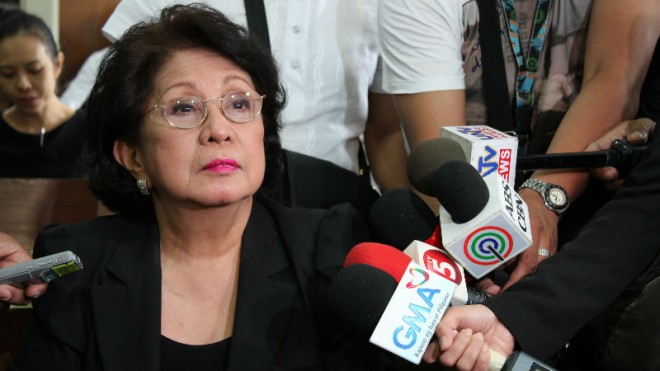
OMBUDSMAN AT SC HEARING Ombudsman Conchita Carpio Morales appears at the high court oral arguments in Baguio City in connection with her petition against Makati Mayor Junjun Binay’s plea in the Court of Appeals to stop his suspension. TARRA QUISMUNDO
BAGUIO CITY, Philippines—A defiant Ombudsman Conchita Carpio Morales defended her decision to suspend Mayor Jejomar Erwin “Junjun” Binay Jr., warning the Supreme Court that stopping her investigation into alleged corruption in Makati City would create a dangerous precedent that might defeat the campaign for public accountability.
Morales expressed hopes that the court would uphold her suspension order, “otherwise, it’s going to create a floodgate for some respondents to be always assailing the rules of the Ombudsman.”
“The Ombudsman is an independent official. It has filed cases not on account of politics but on account of what we believe are findings of fact that call for the filing of cases in court or for administrative adjudication,” Morales told reporters before the hearing.
Taking questions from magistrates, the retired associate justice of the Supreme Court reiterated that evidence was strong enough to warrant Binay’s suspension over allegations that he had conspired to pad the construction price of the P2.3-billion Makati City Hall Building II.
“There was misconduct, dishonesty, neglect of performance of duty,” Morales told Associate Justice Presbitero Velasco Jr.
Enough basis
The Ombudsman appeared during the high court’s oral arguments on her petition to stop the Court of Appeals from granting Binay’s plea to lift his suspension for 60 days pending his investigation.
Speaking in a sharp tone, Morales reiterated to Velasco that there was enough basis to preventively suspend Binay, citing as an example information her office had gathered on the building’s bidding.
“The document said there were three bidders. But one of them said he never ever participated. The other, we cannot find him in his address. Therefore, the document reflecting three bidders was falsified. That’s strong evidence,” said Morales, taking the podium for about 30 minutes in place of her counsel, acting Solicitor General Florin Hilbay.
She asserted how Binay was likely part of a conspiracy to disburse public funds for the project more than a justifiable project price.
“He (Binay) signed contracts. He signed vouchers. You have to collate evidence and you can see that conspiracy was apparent… There appears to be conspiracy,”
Suspension necessary
On Chief Justice Maria Lourdes Sereno’s questioning, Morales said the preventive suspension of Binay and other Makati City officials was necessary for the conduct of a thorough investigation.
“There are pieces of evidence not within reach unless there is preventive suspension, the original copies of which are in custody of city officials, and we want to preserve these evidence,” said Morales.
Even while not required, Morales attended Tuesday’s more than three-hour oral arguments, telling reporters that “there is nothing that should prevent me from coming over here.”
Currently, the Ombudsman is in the preliminary investigation stage in Binay’s case.
“We have conducted investigations, case buildup and we believe that the respondent should be heard, that’s why we are conducting a preliminary investigation to give them the opportunity to controvert evidence so far gathered,” said Morales.
Forgiveness by reelection
Hilbay told the court to take another look at the doctrine of condonation, where an elected official’s liability for an alleged wrongdoing is extinguished by virtue of his reelection.
The younger Binay first signed a contract on the building in question during his first term as mayor, from 2010 and 2013. The fact that he was elected anew in 2013, said the appellate court, showed that the public still had trust in the official.
“It might be high time to reconsider that doctrine in the first place,” Hilbay said, under Sereno’s questioning.
Sereno also noted this point when he asked Hilbay whether condonation, or virtual forgiveness by reelection, was “the message that’s going to be delivered” to hundreds of thousands of local officials.
CA can’t stop probe
For the first time appearing in oral arguments as a magistrate, Associate Justice Francis Jardeleza questioned Hilbay’s contention that the Court of Appeals had no authority to make issuances that impede the Ombudsman’s authority to investigate.
Hilbay was invoking Section 14 of the Ombudsman Act, which provides that “no writ of injunction shall be issued by any court to delay an investigation being conducted by the Ombudsman under this Act, unless there is a prima facie evidence that the subject matter of the investigation is outside the jurisdiction of the Office of the Ombudsman.”
First to interpellate, Jardeleza cited how the high court had earlier ruled how the appellate court may handle Rule 65 (certiorari petitions) against orders of the Ombudsman.
He noted how it took the Ombudsman 16 years “to advance this interpretation.”
“If, as you claim, Congress intended to withdraw the CA jurisdiction over Rule 64 (certiorari) petitions, then why did Congress not insist in this interpretation of yours by enacting a law specifically withdrawing its Rule 65 jurisdiction?,” said Jardeleza.
Hilbay said it was “clear that Congress has denied the power to issue an injunction.”
The court set the next round of oral arguments on April 21 to hear Mayor Binay’s side.
RELATED STORIES
Evidence for misconduct strong, Ombudsman tells SC in defending order vs Binay
SC set to tackle Ombudsman bid to nullify CA TRO on Binay suspension

